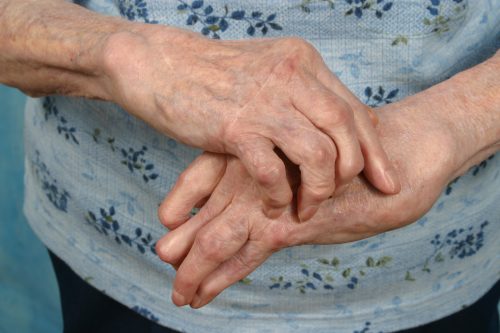
A study published in Arthritis & Rheumatology analyzed rheumatic immune‐related adverse effects (Rh‐irAEs) from immune checkpoint inhibitor (ICI) therapy.
Researchers retrospectively identified 1,293 patients who received any immune checkpoint inhibitor therapy at one institution between Jan. 1, 2011, and March 1, 2018, of which 43 were clinically diagnosed with Rh-irAEs. An additional 18 patients received ICI therapy at a different location, leaving 61 Rh-irAEs-positive patients for analysis.
PD-1 Blockade-induced Inflammatory Arthritis. Our latest Images in Radiology highlights an example of adverse events that may occur during use of immune checkpoint inhibitors. #immunotherapy #PD1 https://t.co/nuG7WV44LO
— Radiology (@radiology_rsna) October 9, 2018
The most frequent clinical syndrome was inflammatory arthritis (IA) (n = 34, prevalence 2%). Myopathy (n = 10) and other rheumatic syndromes (n = 17) were also observed. Most IA cases were polyarticular and 76% of patients (n = 26) needed glucocorticoids. Average length of treatment was 18 weeks; five patients (15%) required disease-modifying drugs, and three (9%) had to terminate ICI therapy. All myopathy patients received glucocorticoids for a mean of 15 weeks. Two deaths occurred and nine patients (90%) permanently stopped ICI treatment. Researchers also observed connective tissue diseases, vasculitis, PMR‐like syndrome, and flared pre‐existing rheumatic disease in patients, most of whom (71%) required immunosuppression treatment; 12% of those patients permanently terminated ICI therapy.
https://twitter.com/arthritis_bio/status/1047371948626329600
The study authors said future studies could determine what causes Rh-irAEs in some patients and not others.
“It remains unclear why some patients develop Rh-irAEs, and so far no genomic risk factors have been identified, though the varied clinical phenotypes of Rh-irAEs certainly suggest multiple underlying immunopathogenic mechanisms,” the researchers wrote. “Further prospective studies that distinguish between subsets of Rh-irAEs are necessary to better understand their pathophysiology and improve clinical care.”
#Arthritis and sicca syndrome are main rheumatic #immune related adverse events (irAE) from immune checkpoint inhibitors (ICI). Others include #myositis and #vasculitis says Dr Clifton O. Bingham, III of Johns Hopkins. #PRD2018 pic.twitter.com/U5Eq62iC3z
— Perspectives in Rheumatic Diseases Conference (@PRDCME) September 14, 2018
“In lieu of controlled prospective studies, this cohort may serve as a guide for rheumatologists managing and counseling patients with Rh-IrAEs,” the authors concluded.
Where Does Cannabinoids Stand for Rheumatic Diseases?
Neutrophil Extracellular Traps in Rheumatic Diseases
American College of Rheumatology Prepares Guideline on Reproductive Health in Rheumatic Disease
Rheumatic Pregnancies: The Challenging Cases
Sources: Arthritis & Rheumatology, Rheumatology News







 © 2025 Mashup Media, LLC, a Formedics Property. All Rights Reserved.
© 2025 Mashup Media, LLC, a Formedics Property. All Rights Reserved.